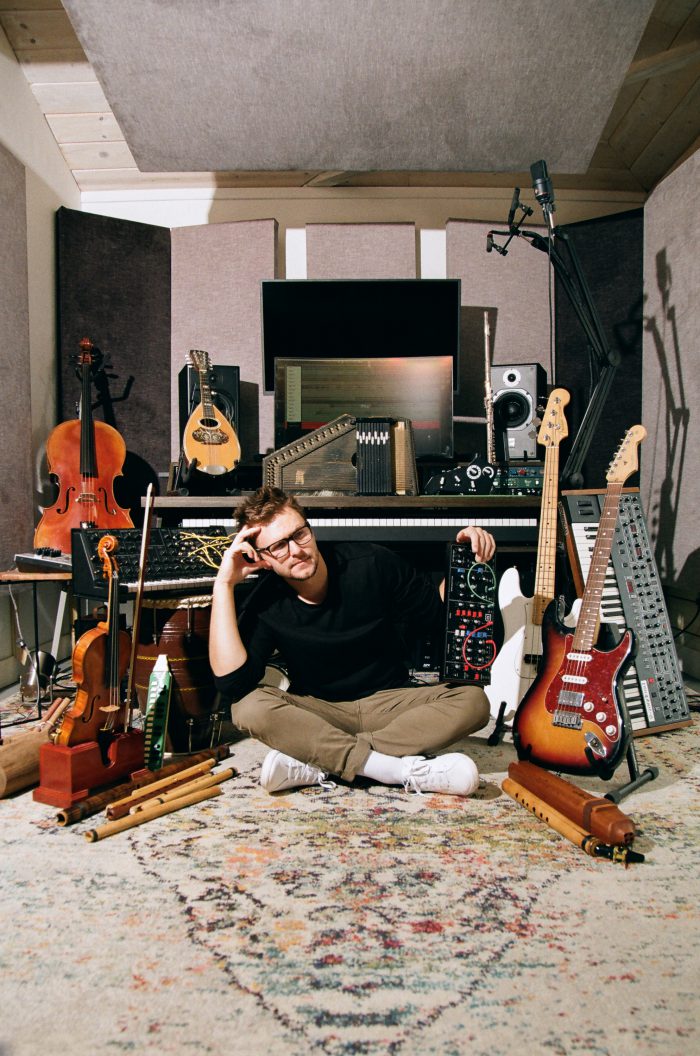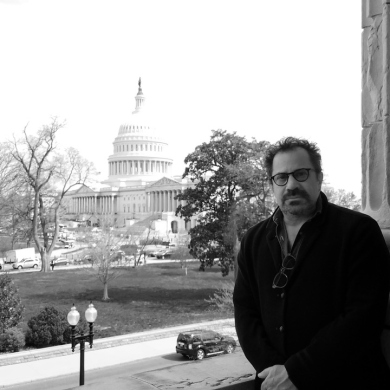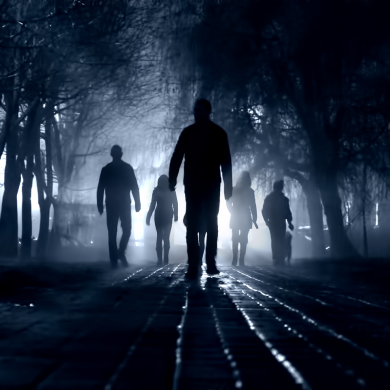Composer Sam Ewing has a lot on his plate at the moment – but for him, it seems like it’s never too much.
We first met Sam in Washington, D.C., when he was a part The Walking Dead team who joined us for “Anatomy of a Television Show: The Walking Dead,” a discussion about making one of television’s biggest hit series of all time.
Since joining The Walking Dead as a composer, Sam has amassed an impressive list of credits, quickly becoming a go-to guy for horror and action films. Sam has also written music for video games, including 2018’s critically acclaimed hit God of War and its highly anticipated 2022 sequel, God of War: Ragnarök.
We caught up with Sam about how he creates the music behind our favorite shows, movies, and video games.

JC: What first got you into composing music?
SE: I started by picking up my dad’s guitar when I was about 10 years old. He’d always been an on-and-off guitar player, but one day a light bulb just went on in my head and I was like “Dad, don’t we have a guitar in this house somewhere?” He went and got it, and I don’t know what it was, but, from that point forward, there was no question that music was my new obsession.
I studied guitar, put a ton of hours into it, then when I was 15, I decided I wanted to go to Berklee College of Music. It’s the only school I applied to, and I, fortunately, got in.
I was pretty pragmatic about my career, and I knew that I couldn’t just do jazz guitar for my whole life, so I pretty quickly pivoted into something that I could more easily sustain myself on. I dabbled in engineering and sound design for video games, but film scoring was what I ended up really focusing on.
JC: What was your introduction to film scoring?
SE: There was a flyer on the wall for a film scoring contest at my school. I entered it and ended up placing as one of the finalists in the contest, and that was my very first foray into film composition.
After that, one of my professors came to me and was like, “You should go work for Bear McCreary! you guys have a similar style, I can hook you up.” So, I went and did an internship with him, and it was perfect timing.
JC: Was Bear doing The Walking Dead at that time?
SE: Yes, he was. When I was at Berklee, I remember watching The Walking Dead and thinking “Wow, this is the coolest show ever,” and I never thought I’d be a composer on it.
Fast-forward, I started working for Bear’s team and I started gravitating toward The Walking Dead, which he really needed help on. At that time, there were a lot of changeups in the leadership of the show, and there was a ton of pressure on the creatives. So, it was a good opportunity for me to step in and help manage the workload. Then a few years later, he gave me the co-composer credit and I continued to get more involved in working with [showrunners] Scott Gimple and Angela Kang.
JC: When you enter a project of that scale, is your process more about sticking to the style of the show, or were you able to work your own taste and style into the score?
SE: The last thing I want to do is make my own personality more important than being in service of the show and the fans.
A project that’s already going and already has its own language requires you to adapt and learn that language rather than making the project about yourself. That said, it’s inevitable that you’re going to impart your own unique fingerprint on a score as a composer.
Once Scott took over as showrunner, there was a demand for a more colorful score, to move away from the orchestral stuff we had been doing before. So, it was a lot more synth-based John Carpenter-esque music. At that point, I was able to help bring some new colors to the score. Then, by the time we got to season nine, I was really in tune with the show and what it needed, and I was able to create new styles that departed from anything we were doing in the past.
JC: Do you run into disagreements about the score, or have you been at this long enough that there’s a mutual understanding of what’s needed in the music?
SE: At least for the last three seasons since I’ve been more heavily involved, I feel like we hit a really good stride. We really found the sound we wanted, and the only challenge was to find out how much the music could elevate the show. We had a lot of opportunity for the music to step up and add to big moments in the series, like mid-season montages or big, suspense-building sequences. The challenge is to identify those musical opportunities and just make the most out of them.
JC: How does it feel to be saying goodbye to this show, after so many years working on it?
SE: In a word, it is bittersweet. In my entire professional life, The Walking Dead has always been a constant. It’s one of the longest running hit shows of all time, and it has one of the biggest fan bases of any series, too. It’s a monster of a project that has made its mark on TV history, and now that it’s ending, it’s a lot to grasp. But I’m also looking forward to doing something fresh and taking the next step in my career.
JC: You’ve got some great other horror credits outside of The Walking Dead (Happy Death Day, The First Purge). What elements of a horror score are unique to that genre?
SE: Well, a lot of times in horror films, especially those that you mentioned, you are trying to make something unbelievable believable. That’s why people watch these movies – they want to be taken to another world. So, it’s the composer’s job to paint a vivid musical world, and that usually means there’s a lot of room for melody, texture, and cool colors. It’s a lot of fun to see how far you can push a scene, rather than having to stay out of its way. That’s why I love horror!
JC: Do you find yourself drawing inspiration from other modern horror scores?
SE: I’m very inspired by the work of other composers in all genres. In horror specifically, I look back to Bernard Hermann’s score for Psycho and John Williams’ score for Jaws. It’s fun to dive into those scores and see what sort of tricks those guys are using orchestrally to create an eerie environment. Obviously, you can’t copy the specific melodies they use or anything like that, but you can look at the techniques they implemented and apply that to your own work.
JC: You talked a bit about the differences between an orchestral score versus a synth-based, minimalist score. How do you know which one a show or movie needs? Is that something you figure out from the script, or the director, or some combination of the two?
SE: In the case of television, that’s really a showrunner decision. With Scott Gimple, he had a distinct vision for The Walking Dead. As the composer, I’m there to serve the showrunner and his vision for the series. He loved a minimalist, synth-based score, so we found a way to connect that sound to the screen.
We use the various musical textures and colors to tell the audience how they should feel about a character. So, with heroes, they might have this warm, comforting sound like a cello. But with a villain, you want it to feel cold and mechanical. Take The Reapers from The Walking Dead, for example. They have deep, belching synth tones and jungle drums that make them feel primal and dangerous. Or Michael Myers in Halloween. He’s an unfeeling killing machine, and his theme music reflects that with a very mechanical and minimal piano melody.
JC: Have you seen any horror movies this year that you really enjoyed?
SE: My wife and I went to see Smile, and we thought it was really fun. I thought the score by Cristobal Tapie de Veer was fantastic. He’s the same composer who did The White Lotus.
JC: Wow, talk about a great score.
SE: Yeah, I’m completely enamored by this guy’s work. He’s really eccentric and weird with his creative decisions. The score for Smile is so atonal and weird. As a listener, it seems ungrounded. It has this effect where you feel like you’re sinking deeper and deeper into darkness, and there’s nothing you can grasp onto to orient yourself with, and I think that was intentional and very effective.
JC: I wanted to ask about your video game career a bit as well. You’ve got God of War: Ragnarok out now!
SE: Yes, in 2015 or so, I was pretty established in Bear’s team, and he had gotten the call about God of War (2018). I don’t remember if it was me or Bear who suggested that I be attached to that project, but I really love video games and I wanted to be a part of it.
So, he allowed me to be his right-hand man on that project, and since then I’ve steadily gotten more involved with it. Then, when the sequel came around, I had built those relationships with the team at Sony Santa Monica, so I was asked to do it again. For Ragnarok, I got to do some of the boss music, which was fun.
JC: Boss music, meaning, music for when you fight an especially powerful foe in the game, right?
SE: Exactly. What’s fun about this music is that there’s no need for subtlety. In a lot of games like God of War, which is very story-driven, there are many stages to a boss battle, so it’s never just a static fight between two characters. You might move from one area to another, and each of those stages requires its own variation on the music.
Aside from that, there’s this added element to the music – we want to make the player sweat a little bit, and actually fear this boss that they’re battling. Creating that feeling is very enjoyable for me as a composer.
Or sometimes, a fight might have a tragic quality, and you want the player to feel sad rather than feeling afraid.
JC: How would you compare the work process on a video game to working on a television show or movie?
SE: Fundamentally, they require a similar approach. You have a set of characters, and you want to build an atmosphere for an audience. You’re trying to create some identifiable themes for the world and for those characters.
That said, in video games, you’re usually dealing with a much longer timeline. So, before you even see any visuals, you’ll probably have some story themes worked out. For example, Bear was already writing some thematic suites for the characters when all we had to work with was some preliminary artwork.
The other big difference is that it’s just way longer – a major single player game like God of War is at least 30 hours of gameplay, and it can certainly be longer than that. So, we’re writing three or four solid hours of music, which is a massive amount. Then, Bear and I don’t get to see how the sausage gets made, meaning we don’t know how our work actually gets put into the game by the music team.
They use all these clever tricks to determine when and in what manner the music plays during the game. There are techniques to make the layers of instruments dynamically come in and out based on how near your character is to enemies. When the battle ends, it will jump from the more dynamic score to something more ambient. The result is that they can stretch out a two-minute piece of music into two hours while the player is exploring the world and fighting enemies. And even though you can tell it’s the same piece of music, it’s never just a basic loop. It’s very exciting to create a piece of music that goes on to live and breathe in real time during the game.
JC: So, with all your experience now, what advice would you offer to a young creative looking to work in this field?
SE: Look for someone who’s doing the job you want, who is further along than you, and work for them. Then the rest of it is focusing on your craft, whatever it may be. Good product wins out in the end, in my experience, and if you can make something that is well-written, and well-produced, the work will speak for itself.



